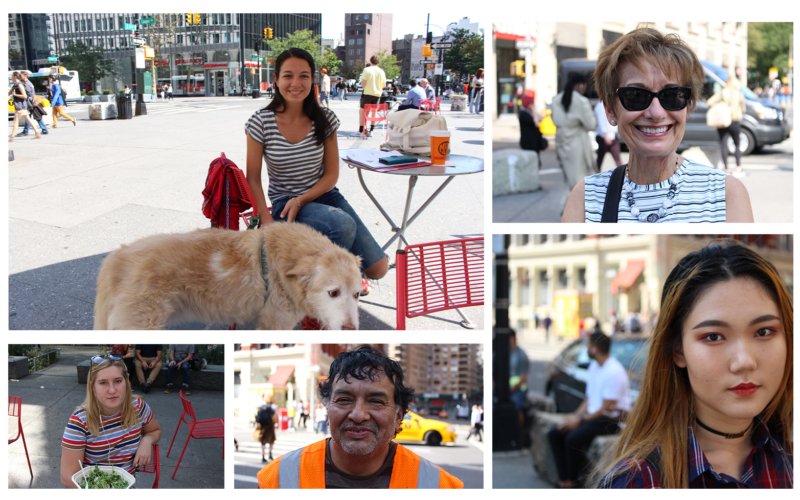New Yorkers Speak Out: United in Support for Ukraine
Media provided by Editor in Chief, Ava Andrews ’22.
“This guy’s f***ing nuts. He’s basically … starting a war, and for what? And … it’s basically a land grab, that’s what I say … and he’s fabricating all kinds of reasons to do what he’s doing. And basically what’s gonna happen is, if he keeps doing that, the world’s gonna jump on his ass … and that’s not gonna be pretty. And I wish he’d just turn around and get the hell out of there without hurting any more people.”
These were the words of Arnold Weinberger, a lifelong New Yorker with very strong and frustrated opinions about Russia’s war in Ukraine. Of course, he’s definitely not the only person in the city with such views. Last week, the Gazette staff interviewed pedestrians in the East Village in an attempt to gauge opinions surrounding the attack Russia initiated against Ukraine.
Many were interviewed in the Ukrainian Village (a small community just east of the High School), but not all were native to the area. Jeffery A. Lamina, a 78-year-old from Boston, told Gazette editor Naaz V. ‘22 that “Putin is a thug,” and that the Russian government itself is “power-grabbing.” Mr. Lamina recognized that his strong opinions were influenced by business he conducted in the immediate post-Soviet era, a time that left a negative impression for many Americans.
In a similar vein, a 31-year-old theater worker said that the invasion is “f***ing ridiculous” and “f***ing upsetting.” These expressions of animosity and scorn towards Russia, while not particularly surprising, were powerful things to hear from so many people.
Some, however, were a bit more skeptical and cautious of the entire situation, particularly regarding the lack of verified information available. For example, a middle-aged man named Boyd walking his neighbor’s dog past the Ukrainian Church told us that he had “no idea what’s going on” and that he “doesn’t trust the media to tell me what’s going on.” He continued, stating that he just “doesn’t really know… it’s scary,” further underscoring the fear and uneasiness the whole situation has brought on him and many other New Yorkers.
John Rayner Turley, 34, said, “We aren’t well educated on this current event; however, we know no invasion is a good thing, and it’s more worrisome to think about the health and safety of those in Ukraine.” The combination of distrust in what government officials are telling the public and the sense of worry for the people of Ukraine is another frequently-heard motif that is expected only to amplify as time goes on.
Many people also believe that directly aiding Ukraine as Americans is not just a possibility, but an obligation. Louis, a Vietnam veteran who has lived in the East Village for 75 years, believed that, as New Yorkers, we ought to pressure people in power to make change. He declared that all of us ought to “speak with our Congress people and make sure they understand the situation and [that we] are worried about it.”
Others, however, think that we, even as ordinary citizens, can do our part to give more immediate aid to the people suffering from the invasion. For example, a pedestrian walking on East 3rd Street, who wished to remain anonymous, mentioned that “New Yorkers can help by supporting Ukrainian restaurants and sending food and supplies to Ukraine.”
Another pedestrian, who spoke to a Gazette reporter on Astor Place, echoed, “The best thing we can do as New Yorkers and as Americans for Ukraine is to raise awareness and funds for basic necessities, education, and general awareness of the current situation.”
Moreover, some believe that social media can lead to unprecedented change. Ken Jacobs, who identified as part Ukrainian, emphasized the power of the internet right now, claiming that, “being proactive, even on social media” is a great way to garner awareness and support Ukrainians. Overall, the overarching consensus was one of disdain for Vladimir Putin and what he’s done.
Even more opinions about the conflict can be found closer to the school community. On Friday, Mar. 4, two Ukrainian/Russian experts visited the High School via Zoom and talked about the economical, historical, and social effects of the current situation unfolding in Ukraine. Dr. Marci Shore, a professor of Modern European history at Yale University who had been following Putin closely long before the invasion, told us that he is “less sharp [and] more isolated,” and isn’t the same person as he was at the dawn of his administration.
In the same presentation, Gregory M. ‘25, elaborated on his relationship with his Ukrainian roots in a moving speech while simultaneously urging the Grace community to both support the people of Ukraine as well as to learn more about their own heritage. He told the audience to “read about your history and study your past, connect with your people, and be proud, strong, and resilient as the people in Ukraine are being proud, strong, and resilient. Speak your mind. You have a voice that people need to hear.”
In times like these, a message like Greg’s — one that encourages unity and fortitude in the face of unimaginable injustice — is a sentiment that many of us can carry with us.
While there is an array of opinions circulating, one concept that is clear within our community and many others is the overwhelming support for Ukrainian people. The anger stemming from Vladamir Putin’s reckless actions is a trend that has inspired unity across a divided global, and local, community.

